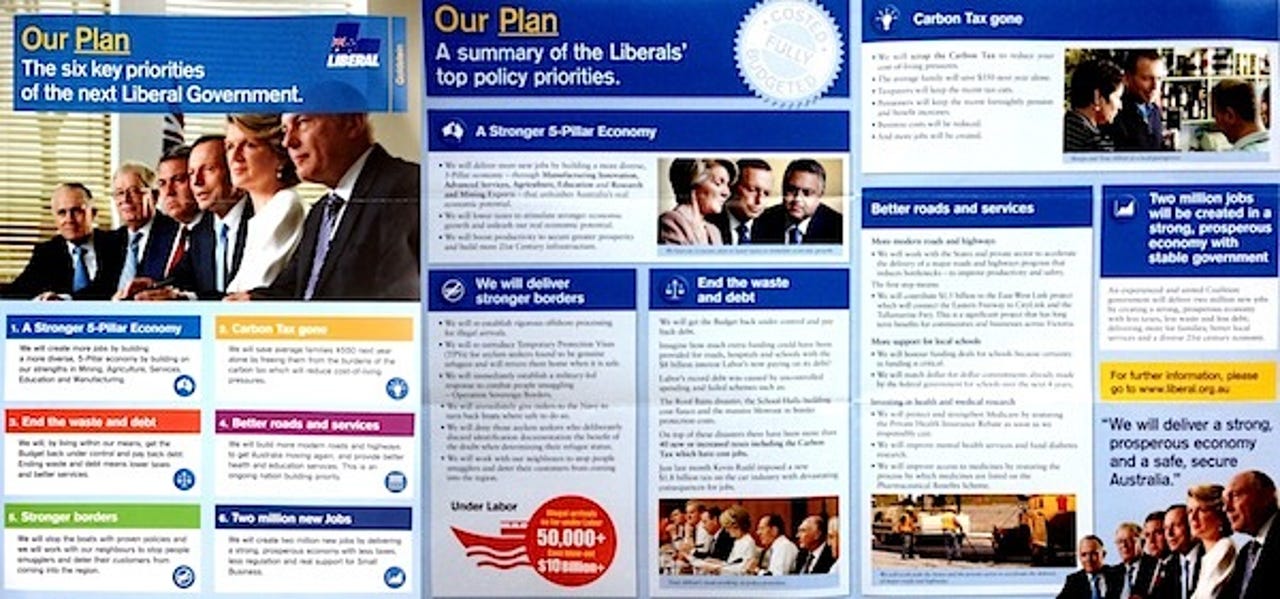Apparently the NBN is no longer a Liberal election priority

For all the ferocity with which Tony Abbott’s Liberals have attacked Labor’s NBN, you would think they perceive it to be an incredibly important issue. Turns out the Liberals perceive it as so unimportant that it doesn’t even rate in the party’s list of six key priorities.
After perusing official Liberal Party campaign material – which was this week dropped in the letterbox of everyone living in Andrew Robb’s federal electorate of Goldstein – this is the only conclusion I can reach.
“The six key priorities of the next Liberal Government”, the headline on the four-page brochure says above a picture of those who would be our overlords come September 8. There’s Malcolm Turnbull, right at the end off the table next to Robb – who is, remember, shadow finance minister and chairman of the Coalition Policy Development Committee – and Joe Hockey, Tony Abbott, Julie Bishop and Warren Truss.

While shadow communications minister Turnbull has a seat at the table, his would-be ministry wasn’t so lucky: there is not a single mention of the NBN or broadband, not even in the usual pejorative Labor-stinks-and-we’ll-do-the-NBN-better sense, anywhere throughout the four pages of Liberal Party propaganda.
The NBN didn't even get its rightful place alongside pink batts and school halls as an example of Labor's "uncontrolled spending and failed schemes".
Nope: if this brochure is correct, the NBN simply doesn’t rate as a Coalition election priority at all. Which seems to be a pretty big omission given that Tony Abbott has committed the rather significant sum of $29.4 billion to the project, and has already promised – at the launch of his party's campaign, no less – that one of his first priorities if elected will be to get stuck into the NBN and issue a revised business plan within 100 days.
Malcolm Turnbull argued the same thing, saying in his recent debate with Alan Kohler that the NBN review was the Coalition's "single most important piece of work in the first 100 days" and that it would try to complete its NBN review within 60 days of the election.
If this brochure is correct, the NBN simply doesn’t rate as a Coalition election priority at all. Which seems to be a pretty big omission given that Tony Abbott has already said one of his first priorities if elected will be to get stuck into the NBN and issue a revised business plan within 100 days.
From the makeup of its policy brochure, the rest of Abbott's leadership team clearly thinks otherwise. They may be simply letting Turnbull believe what he wants to believe, keeping him busy with the NBN while they get on with other priorities.
Of course, this isn’t exactly the most accurate brochure for other reasons: for example, point six is the promised creation of two million jobs. This sounds great as rah-rah policy – but if you consider that Australian Bureau of Statistics figures indicate there are only 701,600 unemployed people in Australia – it appears a key Liberal Party policy is to create 1.3m additional jobs for Australians that don’t actually exist. Perhaps this is how the Coalition plans to finish the NBN on time.
Accurate maths has never been the Coalition’s strong point, with Turnbull happy to inflate the projected cost of Labor’s NBN at every opportunity (his latest estimate is that it will cost “well over $100 billion”) and Abbott somehow doing maths that suggest it will take 80 years to complete the Tasmanian NBN.
Come to think of it, Labor has had its own maths lapses, such as Anthony Albanese’s insistence that under a Coalition policy end users could pay as much as $50,000 for an on-demand fibre connection. Clearly, we didn’t pick these people based on their maths excellence.
Labor has not, of course, completely forgotten the NBN in its campaign advertising; rather, it’s feting the project, for all its bumps and rattles, as a real policy success with tangible impact on voters.
Given the coalition’s usual insistence on countering such claims, one wonders why the Coalition excised all references to the NBN from its print advertising – especially when the party’s broadband policy is more than accessible on its Web site.
Australian Bureau of Statistics figures indicate there are only 701,600 unemployed people in Australia – so it appears a key Liberal Party policy is to create 1.3m additional jobs for Australians that don’t actually exist. Perhaps this is how the Coalition plans to finish the NBN on time.
Perhaps the Coalition doesn’t want to raise any unwelcome questions with voters in Robb’s safe seat, upon whom it is relying on a quick and easy re-election: investigations by voters would quickly reveal that much of his electorate isn’t scheduled to receive NBN services for at least the next three years.
One would think this would make the Liberals even more eager to promote their plan as delivering faster broadband outcomes. But as we all know, in Australian politics – especially when it comes to the NBN – logic doesn’t always rule supreme.
Perhaps the people preparing the brochure forgot to cc: the proofs to Turnbull, or simply forgot to consult the party’s own list of key priorities – which is doubly surprising since this brochure came from the chairman of the party’s policy development team.
Perhaps Robb really just hasn’t been paying attention to the ongoing furore around the NBN. Or, perhaps, it’s a suggestion to the Australian voting public that the NBN simply doesn’t matter anymore. “We don’t actually care about the NBN,” this brochure says, “so neither should you.”
If that’s the case, and this brochure actually reflects Coalition priorities, Turnbull is going to be spending a lot of time alphabetising his videotape collection if the Coalition is elected.
What do you think? A simple printing oversight? Or a sign that the Coalition has changed its priorities?